Part 2: Overcoming Imposter Syndrome as a Neurodivergent Creative
Lessons learned from feeling like an outllier

Missed Part 1?
Part 1: I Am Dyslexic. Do I Belong on Substack?
Lessons I Have Learned
When I told
that I was writing this piece, she asked me:“Are there any things we could learn or take away from your experience for ourselves?”
So what can I pass on as a 49 year old neurodivergent woman living in North East England? Here is my to-do list for anyone who is in a similar position to me. If my situation resonates with you then hopefully this will help. Because if I have learnt anything what usually works for the neurodiverse community can work of the neurotypical community. It’s not rocket science and many of you will already know this stuff. But for those of you who might be looking for some solutions here you go:
Surround Yourself with Like-Minded People
They will give you the confidence to step out of your comfort zone. If you have negative nellies around you all the time they will make you question your ability. Also spend time with people who have overcome imposter syndrome and have come out the other side. Just by spending time with them you will notice how they handle situations they are afraid of.
Let Go of Perfectionism
If you are waiting for the stars to align for your abilities to be perfect, for your work to have won millions of awards, then you will waste a lot of time. Time you could be spending with your community. Time you could be sharing your perspective and thoughts. Perfectionism is so difficult to shake off but this is essential if you want to progress. Giving yourself the grace to make mistakes and fail means that you will grow and become enriched by your experiences. This will actually make you more relatable and give others the permission to not be perfect too. The benefits to your mental health are significant if you can let go of perfectionism.
Just Start—Even If It Feels Uncomfortable
If you are toying with the idea of doing something life changing, which will be a challenge to your imposter syndrome I would say go for it, and start a Substack to document it. For example, I will be sharing my neurodiverse journey and the parts of it that relate to my work. This is something that I have thought about sharing from my own perspective but also as a parent of a neurodiverse child. It has been a real battle for us as a family but by sharing our experience this could help others, make me feel less alone and help me process what we have been through. This has so many benefits to building your confidence too.
Ask the Question
At a DCMS event in Gateshead, MP Lisa Nandy was discussing support for creatives. I had a question but felt my heart racing, my palms sweating. In front of a packed room of MPs, CEOs, and decision-makers, I asked:
"Seeing as 20-50% of the creative sector are neurodiverse, what support will be given to neurodiverse creatives?"
The answer itself isn’t what mattered—it was the act of asking the question. The confidence I gained from that moment was invaluable.
Do The Thing
As well as running Creative Heritage Studios CiC, I design and sell souvenirs on Newcastle Quayside. I wanted to do this for years but let doubt and life commitments hold me back. Now, I’ve completed my first full year of trade, and it has been incredible. Standing on a market stall every weekend has built my confidence levels so much. Meeting customers who travel from all over the world has been a wonderful opportunity to build my confidence and communication skills.
If there is something on your list that you want to try—do it. It doesn’t matter if it fails. Just taking the step is worth it.
Set a Goal
I got to an age where I thought ‘if not now then when?’ This made me think I have another 15 years of working if I want to retire when I am 65 I have to just go for it!! So how would you do this at any age? Set your goal, what you want for your life. Are the things you are doing now aligned with what you want to achieve? If not, set a goal and start working towards it. You will soon realise there are things that you have moved past in order to achieve your goals, one of which will be imposter syndrome.
Talk to the world
I have to say one of the most exciting things about starting my Substack journey is being able to build a community that is international. This is really testing my imposter syndrome. As a dyslexic person I often get people correcting me on my grammar and spelling. But you know what? I want to speak in my authentic voice. My hope is that this authenticity will connect with a wide audience and I will find my people whether they are in the UK or further afield.
This the start of a very exciting journey and I am hoping that if you have read this far you will join me on it.
✨ Hi! I’m Corinne. I run Creative Heritage Studios CIC where we help artists and creatives thrive without compromising their values. We explore the intersection of culture and commerce, create opportunities for neurodiverse creatives, and champion sustainable, impactful projects. If you’d like to support our work or collaborate, learn more here.





